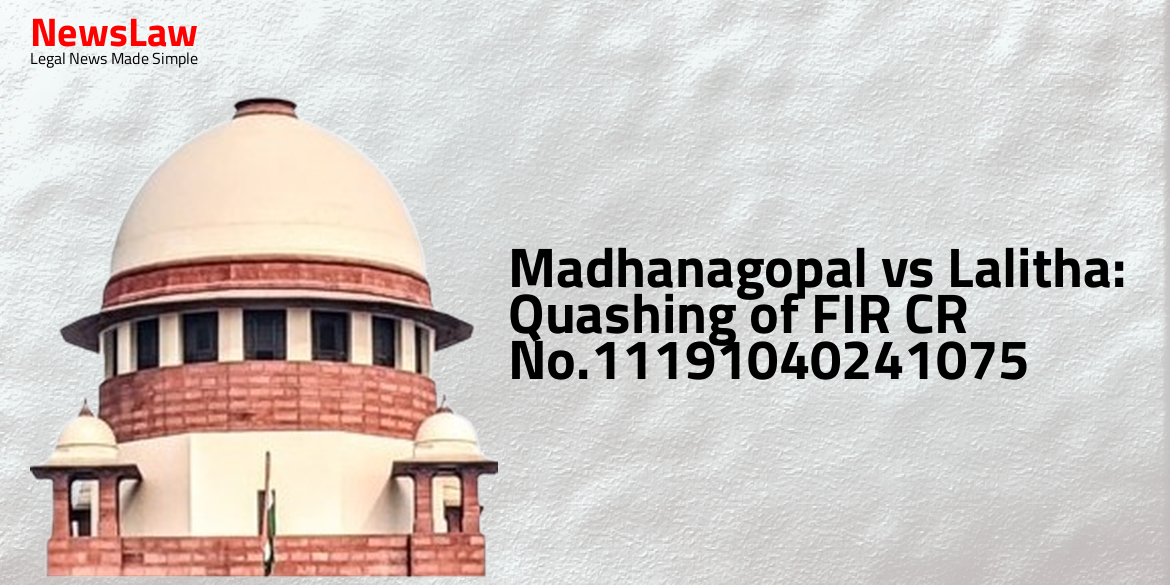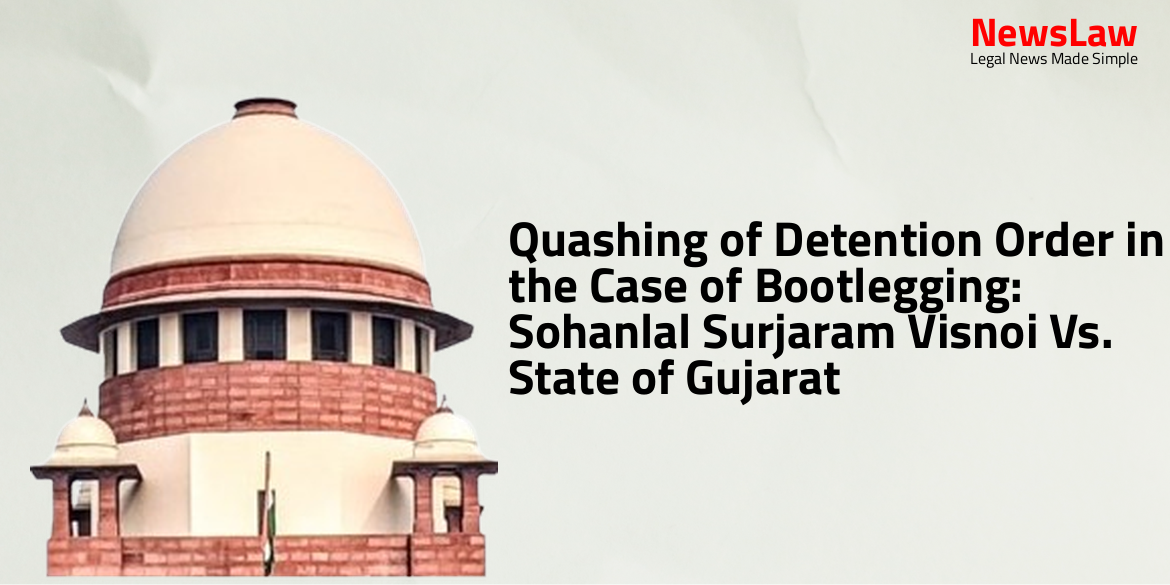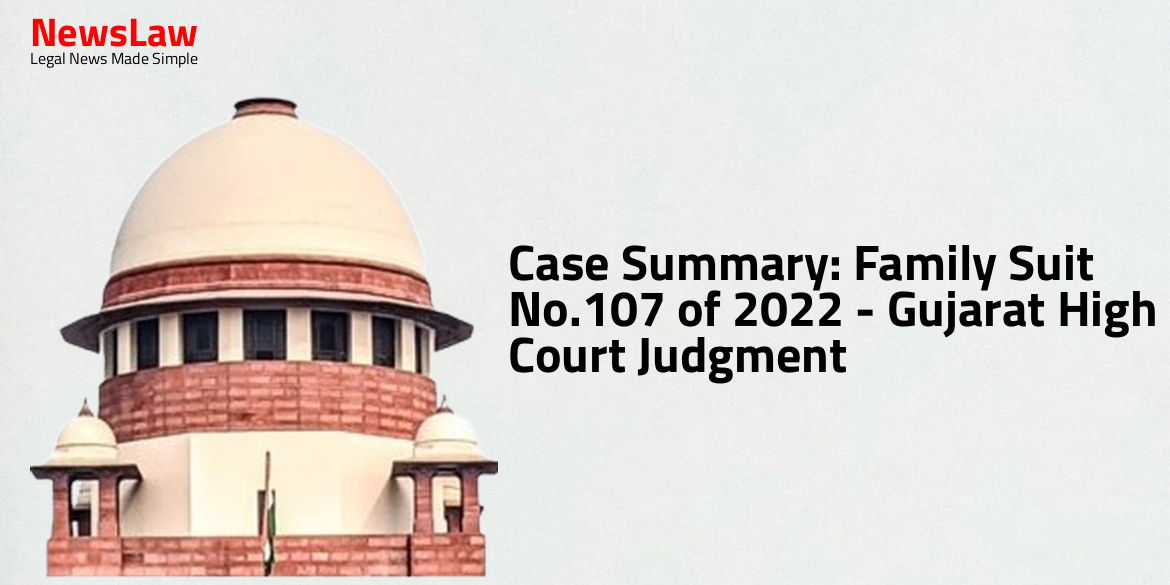In a notable ruling by the Gujarat High Court, the case of Madhanagopal vs Lalitha saw the quashing of the FIR CR No.11191040241075. The dispute, arising from a property discussion leading to a scuffle and damage, has been resolved amicably. Stay tuned for further insights on this significant legal development.
Arguments
- Learned advocate Mr. M. H. Shekhawat has instructions to appear on behalf of the original complainant and seeks permission to file her Vakalatnama, which is granted.
- The dispute between the parties has been resolved amicably as stated by learned advocates on both sides at the Bar.
- The original complainant has filed an Affidavit stating that the dispute has been resolved amicably and she has no objection to quashing the proceedings.
- The impugned FIR was filed at the instance of the respondent alleging a scuffle at the petitioner’s house during a discussion about property, resulting in damage to the complainant’s belongings.
- The High Court must exercise caution in utilizing its power under Section 482 of the CrPC, ensuring that decisions are based on sound principles and not used to stifle legitimate prosecutions.
- The Court should refrain from giving a prima facie decision when the facts are incomplete and the evidence has not been fully collected and presented.
Analysis
- In the case of N.S. Madhanagopal & Anr. vs K. Lalitha, the Supreme Court established the test of obscenity under Section 294(b) of the IPC as whether the matter charged as obscenity has the tendency to deprave and corrupt minds open to immoral influences.
- Reference was made to the decision of the Supreme Court in the case of Mohammad Wajid and Anr. v. State of U.P. and Ors. regarding the offence under Section 506(2) of the IPC. It was highlighted that for an offence of criminal intimidation to be established, the accused must have the intention to cause alarm to the complainant.
- The Supreme Court also emphasized that all penal statutes are to be strictly construed, ensuring that the thing charged is an offence within the plain meaning of the words used without straining the words.
- In the case of State of Haryana v. Bhajan Lal, the categories of cases where the inherent power under Section 482 of the Code can be exercised were outlined. This includes situations where the allegations are absurd and inherently improbable, where there is a legal bar to proceeding, or where the proceeding is maliciously instituted with ulterior motives.
- The High Court’s extraordinary jurisdiction to quash proceedings at any stage was discussed, noting that no hard-and-fast rule can be laid down in this regard.
- The cases of Gian Singh Vs. State of Punjab, Madan Mohan Abbot Vs. State of Punjab, Nikhil Merchant Vs. CBI, Manoj Sharma Vs. State & Ors., as well as Narinder Singh & Ors. Vs. State of Punjab & Anr., were considered in determining the facts and circumstances of the case at hand.
- The court has outlined categories of cases where the extraordinary power under Art. 226 or inherent powers under Section 482 of the Code can be exercised to prevent abuse of process or secure justice.
- These categories include situations where allegations do not constitute an offense, or where the evidence does not support the commission of any offense against the accused.
- In cases where the allegations in the FIR do not amount to a cognizable offense, but rather a non-cognizable offense, the investigation can only proceed with a Magistrate’s order.
- An offense under Section 294(b) of the IPC requires more than just the use of abusive words; there must be evidence that it was to the annoyance of others.
- Considering the amicable settlement between the parties and an affidavit affirming the settlement, the court deems further criminal proceedings as unnecessary harassment and a futile exercise.
- Section 323 of the IPC alleged against the petitioner due to lack of serious injury to the witness.
- The respondent No.2 and/or witness did not sustain any serious injury.
- The petition was allowed by the court.
Decision
- Direct service permitted to the petitioners
- Jail authority directed to release petitioners if not required in any other case
- Rule made absolute only to the extent mentioned
- Impugned FIR CR No.11191040241075 of 2024 at Sardarnagar Police Station, Ahmedabad City quashed and set aside
- All consequential proceedings initiated also quashed and set aside
Case Title: ROCKY SATISHBHAI GARANGE Vs. STATE OF GUJARAT
Case Number: R/CR.MA/9089/2024



